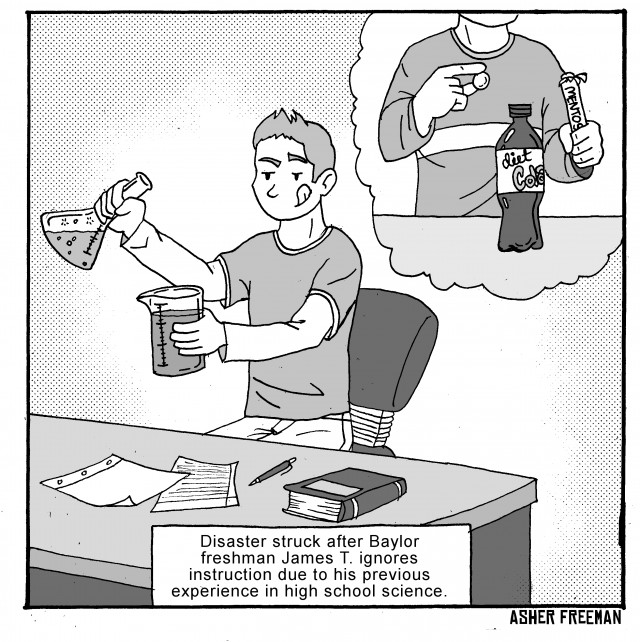The transition from high school to college can be a difficult one. Even without the medical school with the same name, Baylor is well-known for the rigor of its pre-medicine program. Approximately 1,000 freshmen come to Baylor with the declaration of pre-medicine until they take freshman biology.
The department of biology has established a pre-biology major in order to prevent students from declaring a biology major until they have credit for the first two biology classes.
Aside from that, first-year students in general may have trouble in their classes as a result of a lack of preparation in high school.
One way to prepare students better is to start science education classes earlier.
Can you recall how early you really started learning science in elementary school?
Sure, there were probably children-approved “labs” that were brought into classrooms that students glazed over, but science was likely not emphasized as much as math or English.
Another way to help students become better prepared to succeed in college is to encourage early education to be dynamic and hands-on.
This may include a larger emphasis on the use of science labs or real-life applications of mathematics or even readings about current events or important books that shaped the world.
We should also encourage teachers to inspire students through their love of the subject matter.
It’s easier for students to become passionate about a subject if the teacher is also passionate about what he or she is teaching.
Additionally, students are more likely to enjoy a subject they are good at over a subject they constantly struggle with.
The Program for International Student Assessment found in 2012 that there were 22 school systems that scored higher than the U.S. in science, which is up from 18 in 2009.
According to the ACT, only 64 percent of the high school students who took the ACT met the College Readiness Benchmark in English, which is the likelihood the student will have success in a first-year English college course.
The ACT defines readiness for college classes as a 50 percent chance the student will obtain a B or higher or a 75 percent chance the student will earn a C or higher in a first-year college course.
Only a third of students met the benchmark for science and 44 percent met the readiness benchmark in reading and math.
Only 26 percent of all students met the College Readiness Benchmark for all four subjects — English, reading, math and science.
That means 74 percent of students, nearly three out of four, will have trouble in at least one of those four areas upon arriving in college.
The Organization for Economic Cooperation and Development found American 9th graders rank 26th in math and 21st in science out of 34 countries.
Conversely, ninth-graders in Shanghai have the highest math and science scores.
This poses a problem for students, parents and educators who want to see students succeed in college and be sufficiently prepared for their courses at a university.
It also poses a problem for students who come to college at a disadvantage because they were not sufficiently prepared beforehand.
Readiness is important for students because students, of course, want to succeed in their classes and make A’s in their classes.
Readiness is also important for educators who want to do a good job of teaching their students.
This is especially true at Baylor, where professors are known to take special interest in the success of their students.
Parents also want their children to succeed in school. They are paying thousands of dollars to send their children to college to get an education, but if their children aren’t ready for the demand and rigor of a college education, it’s doing those students a disservice to send them into an environment where the odds are against them.
There is a strong push for students to go into STEM fields — science, technology, engineering and math.
However, why should we push students to go into a field that they are not sufficiently prepared to succeed in?
This means students, teachers and parents all need to work to ensure college readiness among students who opt to take the college route.
If students are the future of the world, do we really want those who can barely pass the readiness benchmarks for beginning level college classes running it?






